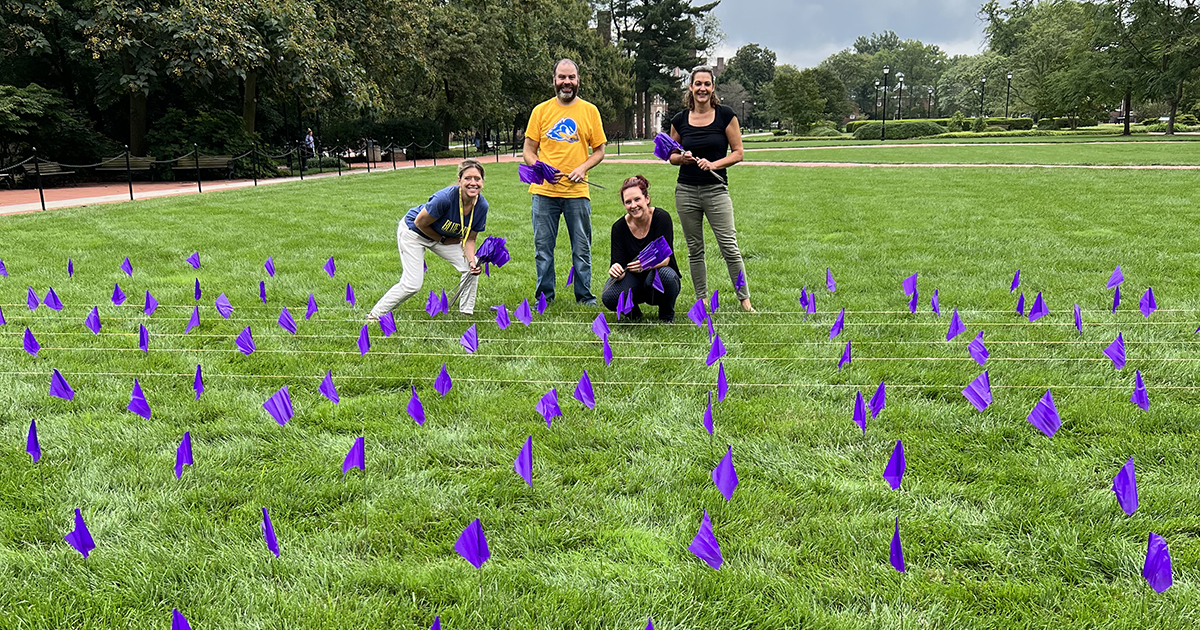

Amnesty Awareness Week
September 12, 2022 Written by Jessica Smith | Photo by Regina Donato
This week, the Office of Student Conduct (OSC) observes its first ever Amnesty Awareness Week starting Monday, September 12 through Friday, September 16. This series of tabling events educates students on the amnesty process, culminating in a joint fair with Student Wellness & Health Promotion and University of Delaware Police on Thursday, September 15.
“We know amnesty information can get lost within all of the other information students are getting in the first week of school,” said OSC Assistant Director Vincent Jackson. “We hope that by promoting amnesty as a tool for students through an entire week, we will have helped a whole new generation of Blue Hens build community by looking out for each other in an emergency.”
After an emergency situation—i.e. alcohol poisoning, sexual misconduct or hazing—amnesty allows harmed students to receive assistance without fear of disciplinary action.
“Amnesty allows the University to forego any punitive measures and focus on supporting a student after a traumatic event,” said Jackson. “It also empowers victims to come forward knowing they’ll be believed and supported even when alcohol or drugs were involved.”
Once amnesty is sought, Jackson said OSC follows up with students within a few days of their incident and schedules a meeting with them to listen to what happened, talk about what may have occurred prior and work with the student to identify ways to learn from the experience.
“As a staff member, I recently met with a student who had never drank alcohol before and didn’t know much about measuring, counting or pacing their drinks, which resulted in a blackout,” said Jackson. “They didn’t know what happened or how they got to the hospital. It was scary for them. I sat with them, and we talked about what happened, how they felt, who was impacted and what they felt they needed to do so they could move on from that night.”
Amnesty doesn’t just apply to students asking for help for themselves. The process often involves students seeking medical attention on behalf of another student. “Amnesty isn’t about getting someone in trouble,” said Jackson. “You aren’t reporting that someone got drunk or high; you’re calling for help.”
Master Corporal Alaina Battle serves on the Community Resource Unit for UDPD and has witnessed firsthand how the amnesty policy has allowed students to protect each other from harm.
“While working on patrol, I have responded to several severe alcohol overdoses where individuals were unconscious and slowed breathing,” Battle said. “If their friends or roommates didn’t react and quickly call 911 for help, I believe the outcome could have been very tragic.”
Since some students might falter at the involvement of police, Battle reiterated to students that UDPD is on their side.
“We want to make sure all of our students are safe and receive the proper medical care in these types of situations,” Battle said. “Our goal is not to get anyone in trouble or make arrests. We want everyone to leave UD at the end of the year the same way they came. Having amnesty available makes it more likely for a student to call when someone needs medical attention.”
While potential alcohol and drug overdoses are common usages, Jackson reminded students that hazing also qualifies for amnesty.
“As students join organizations, clubs and teams, there are a lot of opportunities to engage in traditions and community building. Hazing can ruin that experience for the entire organization,” he said. “If you or your organization are seeking to end the harm of hazing, then the University can work with you through a similar amnesty process.”
Jackson also urged students to make use of amnesty whenever it is needed to receive assistance as soon as possible. “Remember that amnesty means you can make that call at any time of the day or night, even if you used alcohol or drugs, and especially if you are the victim of assault or sexual misconduct,” he said.
Want to know more about amnesty? Check out the event schedule below to speak with OSC representatives in person this week.
“Whether it’s a tabling event or the fair on Thursday, we want students to come out and ask questions, dispel any myths and look out for one another, even the students you don’t know personally,” said Jackson.
Amnesty Awareness Week Events — September 12–16, 2022
Monday, September 12
- 12–2 p.m.: UDPD pop-up tent on The Green
- 2:30–4:30 p.m.: OSC tabling at Perkins
Tuesday, September 13
- 12–2 p.m.: OSC tabling at Trabant
- 5:30–8 p.m.: OSC tabling at Men’s Soccer game in Grant Stadium
Wednesday, September 14
- 12–2 p.m.: UDPD pop-up tent on The Green
- 4–6 p.m.: OSC tabling at Panhellenic Picnic at Harrington Turf
- 5:30 p.m.: Presentation to SGA
Thursday, September 15
- 11:30 a.m.–2:30 p.m.: Amnesty Awareness and Risk Reduction Information Fair on the Central Green
Friday, September 16
- 5–6 p.m.: Tabling at International Coffee Hour in Trabant
